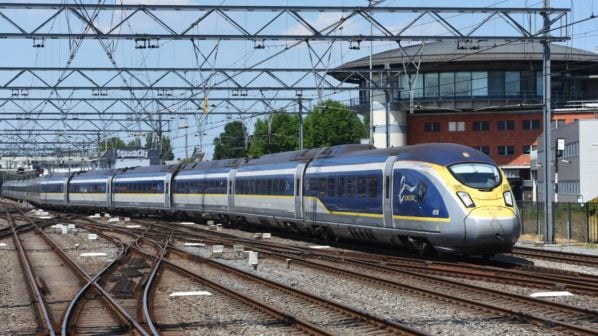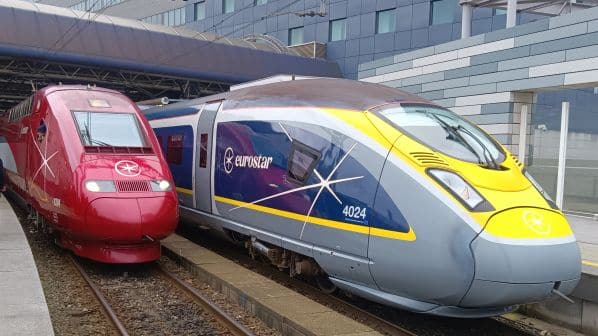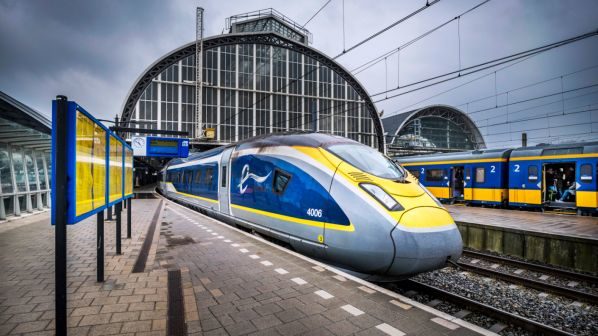DUTCH infrastructure manager ProRail is currently working on revised plans for remodelling Amsterdam Central station with the aim of enabling Eurostar to continue to serve the city as work is in progress.
ProRail had previously decided to prohibit Eurostar from using Amsterdam Central from June 2024 to May 2025, as remodelling work would prevent access to the security and border control facilities necessary for travel through the Channel Tunnel to Britain, located adjacent to platform 15.
Speaking at an event held in London on October 9 to launch the high-speed operator’s new brand and marketing campaign following its merger with Thalys, Eurostar CEO, Ms Gwendoline Cazenave, said that stakeholders were due to meet by the end of this month to consider the revised plans. “The story is not over yet,” she said.
Following ProRail’s decision that work by Netherlands Railways (NS) to build a new, larger Eurostar terminal could not take place without closing the existing facility, Cazenave told IRJ that Eurostar and fellow stakeholders, including ProRail, NS and the Dutch Ministry of Infrastructure, had jointly appointed Swiss consultancy SMA to examine the alternatives.
SMA has recommended that the existing terminal should be closed later and the new terminal opened sooner. Ideally, says Cazenave, these processes should also overlap. “We are really looking for no gap, a solution,” she said, pointing to support from the city of Amsterdam, which has offered to make land available to facilitate building work.
Asked about plans to divert Eurostar services to Amsterdam South, which is to be developed as a hub for international high-speed services, Cazenave said: “I’ve never heard of that solution.”
Amsterdam is a key market for Eurostar, as it works to grow its business and meet the objective of carrying 30 million passengers a year by 2030. Cazenave said that London - Amsterdam had experienced the most growth of any Eurostar route since the Covid-19 pandemic, with traffic doubling since 2019.
Strong summer
Across the business, Eurostar COO, Mr François Le Doze, reported a “very strong” summer, particularly for leisure travel from London. “There were days and weeks when the trains were packed,” he said, with leisure traffic also boosted more recently by France hosting the 2023 Rugby World Cup between September 8 and October 28, which has seen a 30% increase in sales compared with 2019.
Business traffic remains at around 80% of pre-pandemic levels, however. According to Le Doze this is “a common number” and similar to what airlines are currently reporting.
A strong summer holiday season and the Rugby World Cup have meant that Eurostar’s London terminus at St Pancras International has been processing up to 18,000 passenger a day, Cazenave reported.
“We are really managing to grow,” she said, noting that capacity at St Pancras has improved to the extent that Eurostar has reduced the number of trains where bookings have been limited so as to prevent check-in, security and passport control facilities from being overwhelmed. Eurostar has worked with stakeholders to increase staffing levels alongside investment that has included new automatic gates to read passports.
“We have very few trains that are still capped,” Cazenave said.
Such investment remains concentrated on Eurostar’s core routes from London to Paris, Brussels and Amsterdam as the company works to maximise passenger revenue and pay off the debt incurred to keep operating during the pandemic when it lost 90% of turnover.
Asked if Eurostar would restore services to intermediate stations such as Ebbsfleet and Ashford in Britain, Cazenave said that, along with destinations in France such as Marne-la-Vallée, they would have to wait until more resources were available, both in terms of personnel and funding.
“We will tackle this subject once we can afford it,” she said.




